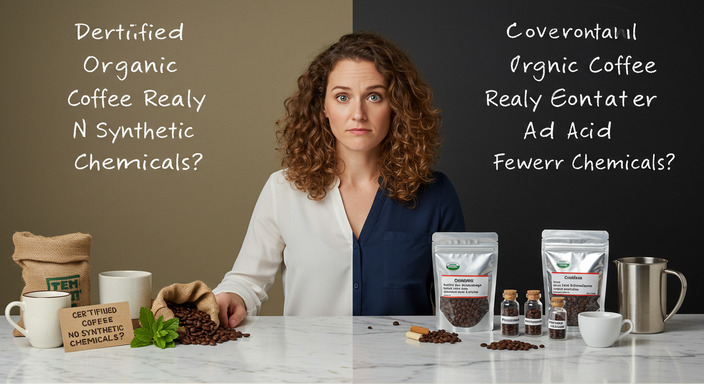
Difference Between Organic and Natural Coffee Explained Clearly

Table of Contents
ToggleIntroduction to Organic and Natural Coffee
What is Organic Coffee?
Organic coffee is more than just a beverage; it’s a commitment to sustainability and health. Grown without the use of synthetic pesticides, herbicides, or chemical fertilizers, organic coffee is cultivated in harmony with nature. Farmers rely on natural methods like composting, crop rotation, and shade-growing techniques to maintain soil fertility and protect ecosystems. This approach not only preserves the environment but also ensures the purity of the coffee beans.
To be certified organic, coffee must meet strict standards set by organizations like the USDA. These standards ensure that every step of the process—from farming to processing—adheres to eco-friendly practices. Choosing organic coffee means supporting sustainable agriculture, protecting biodiversity, and reducing your exposure to harmful chemicals.
What is Natural Coffee?
Natural coffee, often confused with organic, refers to a specific processing method rather than the farming practices. In this method, coffee cherries are dried whole, allowing the beans to absorb the natural sugars and flavors from the fruit. This traditional approach, also known as the dry process, results in a sweeter, fruitier cup of coffee with a distinct profile.
While natural coffee isn’t inherently organic, it can be when grown using organic farming practices. The key difference lies in the focus: organic coffee emphasizes eco-conscious farming, while natural coffee highlights the processing technique. Both, however, contribute to a more authentic and sustainable coffee experience.
Key Differences Between Organic and Natural Coffee
Certification and Standards
One of the most significant distinctions between organic and natural coffee lies in certification. Organic coffee is rigorously regulated and must meet strict standards set by organizations such as the USDA or international equivalents. To earn the organic label, coffee must be grown without synthetic pesticides, herbicides, or chemical fertilizers, and farms must adhere to sustainable practices. These certifications ensure transparency and trust for consumers.
On the other hand, “natural” coffee lacks a standardized definition. While it may imply minimal processing, it doesn’t guarantee the absence of chemicals or adherence to sustainable farming methods. This ambiguity makes it essential for consumers to look for third-party certifications when choosing coffee that aligns with their values.
Farming Practices
Organic coffee farming prioritizes soil health, biodiversity, and ecological balance. Farmers often use natural compost, shade-growing techniques, and crop rotation to maintain fertile land and protect ecosystems. These practices not only produce high-quality beans but also reduce environmental harm and support local wildlife.
In contrast, natural coffee may or may not follow these sustainable practices. Without certification, there’s no guarantee that the coffee was grown in a way that minimizes harm to the environment. This uncertainty can make it harder for consumers to make eco-conscious choices.
Environmental Impact
Choosing organic coffee can have a profound positive impact on the planet. By avoiding synthetic chemicals, organic farming prevents soil and water contamination, protects pollinators, and reduces greenhouse gas emissions. Additionally, shade-grown organic coffee preserves forests and provides habitats for birds and other wildlife.
Natural coffee, while potentially less harmful than conventionally grown coffee, lacks the same level of environmental accountability. Without clear standards, it’s difficult to assess its true ecological footprint. For those committed to sustainability, organic coffee remains the more environmentally responsible option.
Health Benefits of Organic Coffee
Fewer Pesticides and Chemicals
One of the most significant advantages of choosing organic coffee is the reduced exposure to harmful pesticides and chemicals. Conventional coffee farming often relies on synthetic pesticides, herbicides, and fertilizers, which can leave residues on the beans. These residues may pose health risks when consumed regularly. Organic coffee, on the other hand, is grown without these synthetic chemicals, using natural methods that prioritize soil health and biodiversity. By opting for organic, you’re not only protecting your body from potential toxins but also supporting farming practices that are safer for the environment and farmers.
Nutritional Advantages
Organic coffee often boasts higher nutritional value compared to its conventionally grown counterpart. Studies suggest that organic farming practices, such as using nutrient-rich compost and avoiding chemical inputs, can enhance the soil’s natural fertility. This, in turn, can lead to coffee beans with higher levels of antioxidants, vitamins, and minerals. Antioxidants, like chlorogenic acids, are particularly abundant in organic coffee and have been linked to numerous health benefits, including reduced inflammation and improved heart health. Additionally, organic coffee is less likely to contain contaminants that can interfere with nutrient absorption, ensuring you get the most out of every sip.
Here’s a quick comparison of organic vs. conventional coffee:
| Aspect | Organic Coffee | Conventional Coffee |
|---|---|---|
| Pesticide Use | None or natural alternatives | Synthetic pesticides |
| Antioxidant Levels | Higher | Lower |
| Environmental Impact | Low | High |
Sustainability and Ethical Considerations
Eco-Friendly Farming Methods
Organic coffee is grown using eco-friendly farming methods that prioritize the health of the environment. Instead of relying on synthetic pesticides and fertilizers, organic farmers use natural alternatives like compost, mulch, and beneficial insects. This approach not only reduces chemical runoff into nearby water sources but also promotes healthier soil, which can sustain crops for generations. Additionally, many organic coffee farms practice shade-grown cultivation, where coffee plants are grown under the canopy of trees. This method preserves biodiversity, provides habitats for wildlife, and helps combat deforestation.
Fair Trade and Ethical Sourcing
When you choose organic coffee, you’re often supporting fair trade and ethical sourcing practices. Fair trade ensures that farmers receive fair wages for their labor, enabling them to invest in their communities and improve their quality of life. Ethical sourcing goes beyond fair pay—it also focuses on safe working conditions, gender equality, and environmental stewardship. By purchasing organic coffee that’s certified fair trade, you’re contributing to a system that values both people and the planet. Here’s how fair trade makes a difference:
- Guarantees a minimum price for coffee, protecting farmers from market fluctuations.
- Supports community development projects like schools and healthcare facilities.
- Encourages sustainable farming practices that protect ecosystems.
The Bigger Picture: Why It Matters
Choosing organic coffee isn’t just about enjoying a better-tasting cup—it’s about making a positive impact on the world. Every sip supports a system that values sustainability, health, and fairness. By opting for organic and ethically sourced coffee, you’re helping to reduce the environmental footprint of agriculture, supporting small-scale farmers, and promoting a more equitable global trade system. It’s a small choice that can lead to big changes for the planet and its people.
How to Identify Truly Organic Coffee
Understanding Labels and Certifications
When shopping for organic coffee, the first step is to understand the labels and certifications that guarantee its authenticity. Look for the USDA Organic seal, which ensures the coffee is grown without synthetic pesticides, herbicides, or fertilizers. This certification also requires that the farming practices promote ecological balance and conserve biodiversity.
Other reputable certifications include:
- Fair Trade Certified: Ensures fair wages and ethical treatment of farmers.
- Rainforest Alliance Certified: Focuses on sustainable farming and environmental protection.
- Bird Friendly Certified: Guarantees shade-grown coffee that supports bird habitats.
Always check the packaging for these labels, as they are a reliable indicator of truly organic and ethically sourced coffee.
Tips for Choosing Quality Coffee
Beyond certifications, there are several factors to consider when selecting high-quality organic coffee:
- Origin: Coffee from specific regions, like Ethiopia or Colombia, often has distinct flavors and is more likely to be grown using traditional, organic methods.
- Roast Date: Freshness matters. Look for coffee with a recent roast date to ensure the best flavor.
- Whole Beans vs. Ground: Whole beans retain their flavor longer. Grinding them just before brewing ensures a richer, fresher cup.
- Packaging: Opt for coffee in resealable, airtight bags to maintain freshness and prevent exposure to moisture or light.
By paying attention to these details, you can enjoy a cup of coffee that’s not only organic but also delicious and sustainable.
Natural Coffee: Pros and Cons
What It Really Means
Natural coffee, often referred to as “dry-processed” coffee, is a method where coffee cherries are dried whole before the beans are extracted. This process allows the beans to absorb flavors from the fruit, resulting in a fruitier and sweeter profile compared to other processing methods. However, the term “natural” can sometimes be misleading, as it doesn’t necessarily mean the coffee is organic or sustainable—it simply refers to the drying process.
Potential Limitations
While natural coffee has its unique appeal, there are some potential downsides to consider:
- Inconsistent Flavor: The natural drying process can lead to variability in taste, which might not appeal to everyone.
- Higher Risk of Defects: Without careful handling, natural coffee beans are more susceptible to mold or fermentation issues.
- Environmental Impact: The method often requires significant water resources for cleaning, which can be a concern in water-scarce regions.
Making the Right Choice for You
Choosing between organic and natural coffee isn’t just about taste—it’s about aligning your values with your daily habits. Whether you’re motivated by health, sustainability, or ethical considerations, understanding the differences can help you make a decision that feels right for you.
Aligning Your Values with Your Coffee Choices
When selecting your coffee, consider what matters most to you. Organic coffee is grown without synthetic pesticides or fertilizers, making it a healthier choice for you and the environment. It also supports fair trade practices, ensuring farmers are paid fairly for their work. On the other hand, natural coffee may not carry the same certifications but often emphasizes minimal processing and a focus on preserving the coffee’s inherent qualities.
Ask yourself:
- Do I prioritize environmental sustainability?
- Am I concerned about the health impacts of pesticides?
- Do I want to support ethical farming practices?
Your answers to these questions can guide you toward the coffee that best reflects your values.
Practical Steps to Switch to Organic or Natural Coffee
Transitioning to organic or natural coffee is easier than you might think. Here are some simple steps to get started:
- Look for certifications: Check for labels like USDA Organic, Fair Trade, or Rainforest Alliance to ensure the coffee meets specific standards.
- Start small: Replace one cup of your regular coffee with an organic or natural option to ease into the change.
- Explore local roasters: Many small businesses prioritize sustainable and ethical sourcing, offering high-quality options.
- Read labels carefully: Understand the differences between “organic,” “natural,” and other terms to make informed choices.
Remember, every cup of coffee you choose is an opportunity to support practices that align with your values. Whether you opt for organic or natural, you’re making a positive impact on your health, the environment, and the lives of coffee farmers.
FAQ
Is organic coffee more expensive? Yes, organic coffee often costs more due to the rigorous farming practices and certifications required. However, many find the benefits to health and the environment worth the investment. Can natural coffee be organic? Not necessarily. While natural coffee focuses on minimal processing, it may not meet the strict standards required for organic certification. How can I ensure my coffee is ethically sourced? Look for certifications like Fair Trade or Rainforest Alliance, which indicate that the coffee was produced under fair labor and environmental conditions.
By taking these steps, you can enjoy your coffee knowing it aligns with your values and contributes to a healthier, more sustainable world.
is an editor at Coffee With Finance and a true coffee enthusiast. He explores roasts, flavors, origins, and brewing methods, sharing stories that captivate both beginners and experts. Petter believes great coffee sparks meaningful moments—and that includes simple, jargon-free talks about personal finance. His content blends aroma, flavor, and insight, making each coffee break an inspiring and enriching experience.




























Post Comment